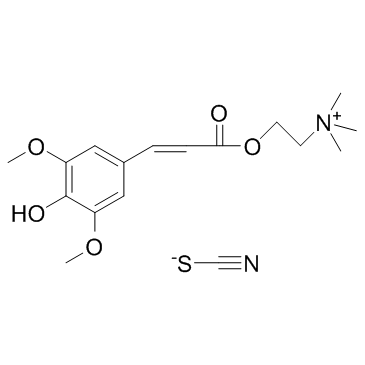Sinapine thiocyanate |
| رقم الكتالوجGC30033 |
سينابين ثيوسيانات هو قلويد معزول من بذور الأنواع الصليبيةيعرض Sinapine thiocyanate تأثيرات مضادة للالتهابات ، ومضادة للأكسدة ، ومضادة للأورام ، ومضادة لتولد الأوعية ، وتأثيرات واقية من الإشعاعSinapine thiocyanate هو أيضًا مثبط لأسيتيل كولينستراز (AChE) ويمكن استخدامه في البحث عن مرض الزهايمر ، والرنح ، والوهن العضلي الوبيل ، ومرض باركنسون
Products are for research use only. Not for human use. We do not sell to patients.

Cas No.: 7431-77-8
Sample solution is provided at 25 µL, 10mM.
Sinapine is an alkaloid from seeds of the cruciferous species which shows favorable biological activities such as antioxidant and radio-protective activities.
Sinapine increases the sensitivity of Caco-2 cells to doxorubicin in a dose-dependent manner, whereas no or less effect is observed in the cells treated with doxorubicin alone. The combination of Sinapine and doxorubicin has a synergistic effect and increased the cytotoxicity of doxorubicin against Caco-2 cells. Results indicate that Sinapine plays an important role in the down-regulation of P-glycoprotein expression through suppression of FGFR4-FRS2a-ERK1/2 signaling pathway[1]. Sinapine can effectively protect against OH-induced damages to DNA and MSCs, thereby it may have a therapeutic potential in MSCs transplantation[2].
During the first 8 days, the dry matter intake and live weight gain of the rats are significantly reduced by the intake of sinapine and other phenolic compounds. However, after this adaptation period their performances are similar to those of the control group[3].
[1]. Guo Y, et al. Sinapine as an active compound for inhibiting the proliferation of Caco-2 cells via downregulation of P-glycoprotein. Food Chem Toxicol. 2014 May;67:187-92. [2]. Li X, et al. Protective Effect of Sinapine against Hydroxyl Radical-Induced Damage to Mesenchymal Stem Cells and Possible Mechanisms. Chem Pharm Bull (Tokyo). 2016;64(4):319-25. [3]. Vermorel M, et al. Valorization of rapeseed meal. 5. Effects of sinapine and other phenolic compounds on food intake and nutrient utilization in growing rats. Reprod Nutr Dev. 1987;27(4):781-90.
Average Rating: 5 (Based on Reviews and 8 reference(s) in Google Scholar.)
GLPBIO products are for RESEARCH USE ONLY. Please make sure your review or question is research based.
Required fields are marked with *




















